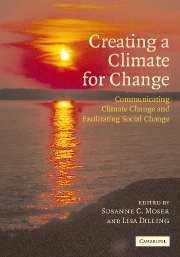Book contents
- Frontmatter
- Contents
- Preface
- Foreword
- List of contributors
- List of tables
- List of figures
- List of text boxes
- Introduction
- Part I Communicating climate change
- 1 Weather or climate change?
- 2 Communicating the risks of global warming: American risk perceptions, affective images, and interpretive communities
- 3 More bad news: the risk of neglecting emotional responses to climate change information
- 4 Public scares: changing the issue culture
- 5 The challenge of trying to make a difference using media messages
- 6 Listening to the audience: San Diego hones its communication strategy by soliciting residents' views
- 7 The climate-justice link: communicating risk with low-income and minority audiences
- 8 Postcards from the (not so) frozen North: talking about climate change in Alaska
- 9 Climate change: a moral issue
- 10 Einstein, Roosevelt, and the atom bomb: lessons learned for scientists communicating climate change
- 11 Across the great divide: supporting scientists as effective messengers in the public sphere
- 12 Dealing with climate change contrarians
- 13 A role for dialogue in communication about climate change
- 14 Information is not enough
- Part II Facilitating social change
- Part III Creating a climate for change
- About the authors
- Index
- References
12 - Dealing with climate change contrarians
Published online by Cambridge University Press: 20 August 2009
- Frontmatter
- Contents
- Preface
- Foreword
- List of contributors
- List of tables
- List of figures
- List of text boxes
- Introduction
- Part I Communicating climate change
- 1 Weather or climate change?
- 2 Communicating the risks of global warming: American risk perceptions, affective images, and interpretive communities
- 3 More bad news: the risk of neglecting emotional responses to climate change information
- 4 Public scares: changing the issue culture
- 5 The challenge of trying to make a difference using media messages
- 6 Listening to the audience: San Diego hones its communication strategy by soliciting residents' views
- 7 The climate-justice link: communicating risk with low-income and minority audiences
- 8 Postcards from the (not so) frozen North: talking about climate change in Alaska
- 9 Climate change: a moral issue
- 10 Einstein, Roosevelt, and the atom bomb: lessons learned for scientists communicating climate change
- 11 Across the great divide: supporting scientists as effective messengers in the public sphere
- 12 Dealing with climate change contrarians
- 13 A role for dialogue in communication about climate change
- 14 Information is not enough
- Part II Facilitating social change
- Part III Creating a climate for change
- About the authors
- Index
- References
Summary
Introduction
Industrial societies have developed through the extraction and consumption of fossil fuels. Many of the most powerful industries in the United States, both historically and at present, depend upon the use of fossil fuels. Also, the fortunes of many of the wealthiest and most powerful families in the United States are founded within the fossil fuels industry. Further, a very large proportion of the manufacturing jobs in the United States are connected with the use of these fuels. Thus it is not surprising that proposals to substantially reduce their use, or even just to reduce emissions of heat-trapping gases from their use, to mitigate the effects of climate change encounter stunning obstacles and are seen as deeply threatening by powerful economic and political actors.
A coordinated anti-environmental countermovement (see, e.g., Austin, 2002; Beder, 1997; Helvarg, 1994; Switzer, 1997) has mobilized in the United States since the late 1980s to challenge the legitimacy of climate change as a problem on which society should act. This response includes both massive lobbying efforts by the American fossil fuels industry (e.g., Gelbspan, 1997; Levy and Egan, 1998; Newell, 2000) and concerted efforts by American conservative think tanks to question the necessity of dealing with climate change (e.g., Luke, 2000; McCright and Dunlap, 2000, 2003). Integral to these efforts has been the promotion of approximately a dozen scientists collectively known as climate change “contrarians” (or sometimes “skeptics”).
- Type
- Chapter
- Information
- Creating a Climate for ChangeCommunicating Climate Change and Facilitating Social Change, pp. 200 - 212Publisher: Cambridge University PressPrint publication year: 2007
References
- 41
- Cited by



